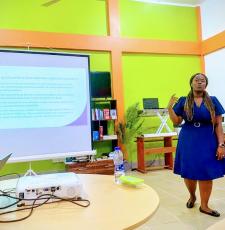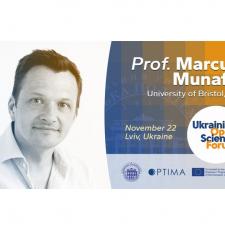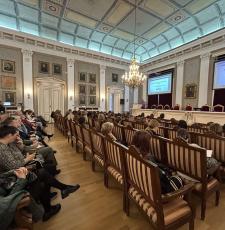
‘Is your institution willing and committed to offer training on open access, open research data and open science as a part of standard training for PhD students?’
This is the question we asked our network a year ago. We also offered support in developing such training courses for those who were interested.
Six institutions in six countries responded to our call, and sent us expressions of interest and commitment. They are Addis Ababa University (Ethiopia), Chinhoyi University of Technology (Zimbabwe), Council of Scientific and Industrial Research (Ghana), Kaunas University of Technology (Lithuania), Nepal Health Research Council (Nepal) and University of Dar es Salaam (Tanzania).
Africa and Asia open science train-the-trainer workshop
EIFL brought together 12 trainers from the institutions that responded, from Ethiopia, Ghana, Nepal, Tanzania and Zimbabwe, for a four-day open science train-the-trainer workshop hosted by Addis Ababa University in June 2017. We invited Jeroen Bosman and Bianca Kramer, both of Utrecht University Library (the Netherlands), and Nancy Pontika of the Open University (United Kingdom) to join us as facilitators. [Training materials are publicly available here.]
Together with the facilitators we designed open science training programmes for the 12 trainers’ institutions. We did this by reusing FOSTER Open Science Learning Objectives. The FOSTER project later included our workshop programme and training materials as examples in the first draft of a handbook that is being written for open science trainers. This is one of the reasons why we love sharing!
Two of our trainees from Addis Ababa University and CSIR/Ghana were accepted to take part in the CODATA-RDA Research Data Science Summer School in July of 2017. As a further contribution to open science capacity at these institutions, we supported their travel expenses to attend this major international event, which took place in Trieste in Italy.
Rolling out open science training in Ghana and Zimbabwe
Trainers from Ghana and Zimbabwe who took part in our open science train-the-trainer workshop have already begun conducting open science training in their institutions.
CSIR/Ghana proposes offering open science training for research scientists, technologists, lecturers and graduate students twice a year. The first training has already taken place: 105 scientists from seven research institutes (Animal Research, Industrial Research, Food Research, Science and Technology Policy Research/ Soil Centre, Water Research, Plant Genetic Resources Research and Oil Palm Research) participated in a 10-day CSIR/Ghana training course in November 2017. The theme of the training was ‘Promoting the use of open access journals, open data and open science among scientists in the CSIR’.
The training also raised awareness about and explained the CSIR Open Access Policy, which was adopted by the Directors’ Management Committee in May 2017 - another successful EIFL project with CSIR/Ghana.
In Zimbabwe, Chinhoyi University of Technology has introduced open science training as part of a residence programme for M.Phil and D.Phil students that takes place every year. In February 2018 over 140 Masters and Doctoral students attended the open science training.
Open science training in Ethiopia, Nepal and Tanzania
Addis Ababa University (Ethiopia) will host training on open research data for early career researchers on 2 March 2018, just a day before International Open Data Day (3 March 2018). The training will include practical sessions on selected open science tools. And it will be a pilot for regular open science training activities for PhD students at the university.
It’s easier to provide open science training if you practice it and we have some good news to share! Our trainee, Solomon Mekonnen, who coordinates the Addis Ababa University training, has been selected to participate in the fifth round of Mozilla Open Leaders with his open science project. The project proposes to translate open research outputs in agriculture into local languages like Amharic, and to communicate scientific terms in plain language that farmers can understand. The translations will be openly available to farmers and the general public using an online platform to facilitate citizen engagement in open science, including data collection and data analysis, with the expectation that citizen involvement will increase agricultural productivity.
Nepal Health Research Council will also kick off open science training activities in celebration of Open Data Day. The plan is to offer training on open access, open research data and open science to PhD students on a regular basis, introducing these new training modules into the council’s current curriculum.
This year we also look forward to the launch of open science training for early career researchers by University of Dar es Salaam (Tanzania) Centre for Continuing Education, in collaboration with dLab (the Tanzania Data Lab). dLab activities include training in data literacy and analysis, focused content-area data analytics, and showcases how data can be used to improve lives.
Launch of accredited courses on open science in Lithuania
Kaunas University of Technology (KTU) responded to EIFL’s call for expressions of interest and commitment to embed open science training for PhD students by proposing to develop an online Research Data Management course, which would include open access, open data and open science. As part of their proposal, KTU committed to offering credits to students who complete the course.
EIFL provided a grant to KTU to develop the course and to organize an open science training session at the 2017 International PhD Summer School.
To support development of the online course, we hosted a webinar with experienced librarians from the University of Tartu (Estonia) and University of Latvia, to share knowledge about how they run their online courses on research data management and on open science
The KTU Research Data Management module (six ECTS credits, European Credit Transfer and Accumulation System) was approved in June 2017 by the Committee of the Joint Doctoral Programme in Educational Science run by four universities: Lithuanian University of Educational Sciences, Lithuanian Sports University, Šiauliai University and KTU. The course will start in autumn 2018 as an optional course for all 18 KTU PhD programmes.
Exciting year ahead for open science training for PhD students and early career researchers!
SHARE / PRINT









